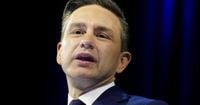In a stunning turn of events, Conservative Leader Pierre Poilievre is projected to lose his long-held Ottawa riding of Carleton, a seat he has represented since 2004. On Monday, April 28, 2025, Liberal candidate Bruce Fanjoy ousted Poilievre, coalescing opposition votes in a federal election that saw the Conservatives gain ridings but ultimately fall short in their leader's own district.
As the results rolled in, Prime Minister Mark Carney, whose Liberals are projected to form a minority government, expressed his confidence in Fanjoy during his victory speech in Ottawa. "He will be a great MP," Carney remarked with a smile, as early results showed Fanjoy leading throughout the evening.
Poilievre's loss is particularly striking given that he led the Conservatives to form the largest official opposition in Canadian history, despite his own defeat. The Conservative Party had gained ridings from both the Liberals and the NDP, but the loss of Carleton means Poilievre will temporarily be without a seat in the House of Commons.
Before the results were finalized, Poilievre addressed supporters at Conservative campaign headquarters, stating, "It will be an honour to continue to fight for you and be a champion for your cause as we go forward." However, the atmosphere shifted dramatically as the night progressed, and Poilievre acknowledged the Conservative party’s defeat at the hands of the Liberals.
"Canadians have opted for a razor-thin minority government. A virtual tie in the vote count," he said late on Monday night. His comments highlighted the tight race and the complex dynamics at play in this election.
Fanjoy, a political newcomer, ran a campaign focused on pressing issues such as building more homes and lowering the cost of living, which resonated with voters in the riding. His approach included extensive grassroots efforts, as he tirelessly knocked on doors to connect with constituents, asserting that the riding "deserved better." By the time the polls closed, Fanjoy was leading with over 3,700 votes, with more than 99 percent of polls reporting.
Despite his long tenure, Poilievre's support eroded in the lead-up to the election, particularly after former Prime Minister Justin Trudeau announced his intention to resign in January 2025, paving the way for Carney's leadership. In the days leading up to the election, reports surfaced indicating that Poilievre was in danger of losing his seat, prompting a last-minute campaign rally in Carleton on April 27, 2025.
According to Elections Canada, Poilievre’s Carleton riding recorded the highest number of ballots cast during the record-setting four days of advanced polls over the Easter long weekend, totaling 43,394. This figure underscores the high stakes of the election for both Poilievre and Fanjoy.
Political analysts have noted the implications of Poilievre's loss for his leadership within the Conservative Party. Daniel Béland, a political science professor at McGill University, remarked in an interview that while nothing legally prevents Poilievre from remaining leader without a seat, he may need to run in another district if he chooses to stay on. "Losing your seat when some people within your own party think you’re the main reason why it failed to win is a clear issue for Poilievre," Béland stated.
As the election concluded, Carney secured his own riding of Nepean with a commanding 63.6 percent of the vote, while Conservative candidate Barbara Bal trailed with 33.4 percent. In a broader view of the election results, the Liberals were leading or elected in 168 seats when counting was paused, just four short of a majority.
Meanwhile, the NDP faced challenges as leader Jagmeet Singh was defeated in his Burnaby Central riding, finishing third behind Conservative candidate James Yan and Liberal candidate Wade Chang. Chang won with a 42.1 percent voting share, further complicating the landscape for the NDP.
In the aftermath of the election, Poilievre stressed the need for reflection and learning from the results. "We know that change is needed, but change is hard to come by. It takes time. It takes work. And that’s why we have to learn the lessons of tonight — so that we can have an even better result the next time Canadians decide the future of the country," he told supporters.
As the dust settles on this election, the implications for both the Conservative Party and the Liberal government are profound. With Poilievre's leadership now under scrutiny and the Liberals positioned to govern, the political landscape in Canada is set for a significant shift. The coming weeks will undoubtedly reveal how these changes will influence policy and party dynamics moving forward.




